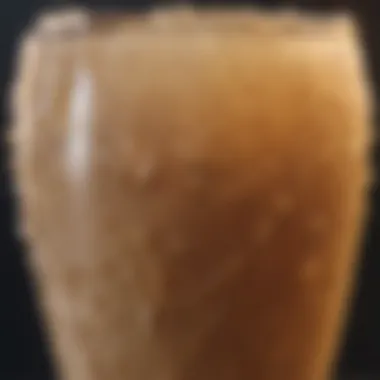Best Shampoo for Very Oily Scalp: Top Picks Revealed


Intro
Managing a very oily scalp can be a significant challenge. Knowing how to care for such a scalp type is crucial for overall hair health. Individuals with this condition often experience frequent need for washing and may struggle with product buildup. Understanding the causes behind an oily scalp is the first step in addressing it. This involves recognizing factors such as excess sebum production and other environmental influences.
Choosing the right shampoo is essential. Some shampoos provide targeted ingredients that effectively reduce oiliness, while others may worsen the problem. This article will delve into the best shampoo options available on the market. It will cover the key ingredients to look for, how these products work, and other factors to consider when selecting the best one for your needs.
Causes of Oily Scalp
An oily scalp can be caused by a variety of factors. Hormonal fluctuations, diet, and even genetics can play roles in the production of excess sebum. Stress is another contributing element; it can increase oil production, leading to greasiness. In addition, environmental elements such as humidity can aggravate oily conditions.
Understanding these causes is crucial to finding an effective shampoo. In some cases, adjustments in lifestyle may also help control oiliness. For example, reducing intake of greasy foods or incorporating stress-relief techniques could prove beneficial.
Ingredients to Target Oily Scalp
Selecting a shampoo with the right ingredients is key to managing oiliness. Here are some notable components:
- Salicylic Acid: This ingredient helps to exfoliate the scalp and remove excess oil without overly stripping it.
- Tea Tree Oil: Known for its antifungal properties, tea tree oil can help with scalp health and reduce oiliness.
- Charcoal: This is effective for cleansing impurities and absorbing excess oil.
- Witch Hazel: An astringent that can help reduce oil production on the scalp.
By knowing these ingredients, consumers can empower themselves to choose the most beneficial products.
Tips for Choosing the Right Shampoo
When selecting the best shampoo for a very oily scalp, consider the following factors:
- Read Labels: Always read the labels carefully. Some shampoos may claim to fight oil but contain heavy oils themselves.
- pH Balance: A shampoo with balanced pH can help maintain scalp health and prevent excess oil creation.
- Avoid Silicones: These can build up on the hair and scalp, leading to more oiliness.
- Frequency of Use: Some shampoos are formulated for daily use, while others are meant for washing every few days. Choose based on your own washing habits.
- Patch Test: Always perform a patch test when trying a new product to ensure it does not cause irritation.
Understanding Oily Scalp
Understanding the condition of an oily scalp is crucial for anyone dealing with excessive oiliness in this area. This section aims to delineate essential characteristics, delve into common causes, symptoms, and how these factors intertwine with hair care, especially when selecting the right shampoo. By grasping the nature of an oily scalp, individuals can navigate their hair care routine more effectively, leading to improved scalp health and overall hair appearance.
Definition of Oily Scalp
An oily scalp is a result of overproduction of sebum, a natural oil created by the sebaceous glands in the scalp. While sebum serves as a protective barrier for hair and skin, its excessive accumulation can result in greasy hair and a host of other complications. Proper identification of an oily scalp is fundamental, as it sets the stage for exploring effective remedies, including choosing suitable shampoos.
Common Causes of Oily Scalp
Hormonal Fluctuations
Hormonal fluctuations often play a significant role in the body's oil production. Changes in hormone levels, such as those experienced during puberty, menstruation, or pregnancy, can lead to an uptick in sebum secretion. This characteristic makes it important to consider hormonal health when tackling oily scalps. Addressing the underlying hormones can be beneficial for long-term management of oily conditions.
Dietary Choices
Dietary habits significantly influence skin and scalp condition. Consuming a diet high in refined sugars and unhealthy fats can trigger increased oil production. A key characteristic is the impact of these dietary choices on inflammation and overall health. While moderation in diet may not eliminate oiliness entirely, improving food quality leads to positive changes in scalp health.
Environmental Factors
Pollution, humidity, and varying climatic conditions contribute to an oily scalp. Environmental stressors can cause the scalp to produce more oil as a protective measure. This factor underscores the reality that control over external variables is limited, making it essential to adapt one's hair care regimen to cope with these challenges. Exposure to harsh chemicals or allergens present in certain hair products can also exacerbate oiliness.
Genetic Predisposition
Genetics can determine the level of oiliness in an individual's scalp. It is a characteristic that might be seen across family lines, indicating that some people are naturally predisposed to have oilier scalps. Recognizing this factor can help in emphasizing the importance of personalized hair care strategies that suit the individual’s unique genetic makeup.


Symptoms of Oily Scalp
Excessive Shine
Excessive shine is one of the most noticeable traits of an oily scalp. Many individuals find that their hair appears glossy, giving it a greasy look, often leading to self-consciousness. This symptom calls for targeted treatment to minimize shine and achieve healthy hair. Maintaining a proper washing regimen can help in reducing shine levels effectively.
Greasy Hair Texture
A greasy hair texture can be unpleasant and may lead to an unkempt appearance. This texture makes hair heavy and difficult to style. Recognizing greasy texture as a symptom allows individuals to seek specific shampoos designed to combat this issue. Regular cleansing and formulation adjustments can work wonders in restoring texture.
Scalp Irritation
Scalp irritation includes symptoms such as itchiness and redness. This irritation can stem from excess oil and can result in discomfort. Finding the right shampoo that soothes the scalp while regulating oil levels can aid in alleviating discomfort. Noticing signs of irritation early is vital, as chronic irritation can lead to more severe scalp conditions.
Impact of Oily Scalp on Hair Health
Understanding the impact of an oily scalp on hair health is crucial for individuals seeking effective solutions. An oily scalp can lead to various physical symptoms, which might create challenges in maintaining healthy hair.
Effects on Hair Appearance
An oily scalp often detracts from the overall appearance of hair. When excess sebum accumulates, it can make hair look sleek, but too much can lead to an unpleasant greasy look. Many people notice that their hair becomes weighed down, making it less voluminous. This can be particularly frustrating for those trying to achieve specific styles or simply looking to maintain a fresh look throughout the day.
Influence on Hair Growth
Another significant aspect to consider is how an oily scalp can influence hair growth. While sebum plays a protective role for hair, excessive oil can clog hair follicles. Clogged follicles can hinder hair growth and may lead to hair loss in some cases. Moreover, an oily environment is often not conducive to healthy hair; the balance of natural oils is essential. Therefore, managing an oily scalp is directly linked to promoting a healthier environment for hair to grow.
Connection to Scalp Conditions
An oily scalp can predispose individuals to certain scalp conditions, further complicating hair health.
Dandruff
Dandruff often manifests due to an oily scalp, characterized by flakes and itchiness. The overproduction of oil can create an environment where specific fungi thrive, leading to dandruff formation. Addressing oily scalp issues may significantly reduce the occurrence of dandruff.
Seborrheic Dermatitis
Seborrheic dermatitis is another condition linked to oily scalps. It presents with red patches, itchiness, and flaking. This skin condition can create a challenging cycle, as scratching may further irritate the scalp. Like dandruff, managing the oil content can be an effective way to reduce symptoms associated with seborrheic dermatitis.
In summary, recognizing the effects of an oily scalp on hair health is critical. Not only do these conditions affect the appearance of hair, but they also pose risks to hair growth and overall scalp health. Therefore, it becomes vital to select appropriate shampoos and care routines that cater specifically to oily scalp concerns.
Finding the Right Shampoo
Finding the right shampoo for a very oily scalp is crucial for maintaining overall hair health. A good shampoo not only cleanses but also regulates sebum production. It contributes to a balanced scalp and helps prevent issues like greasy hair texture and scalp irritation. Individual needs can vary, making it important to pay attention to ingredients and formula types that cater specifically to oily scalps.
Key Ingredients to Look For
Salicylic Acid
Salicylic acid is a well-known ingredient that helps to exfoliate the scalp. It penetrates the hair follicles and removes excess oil and dead skin cells. This process can be beneficial in controlling sebum production, which is essential for individuals with an oily scalp. Its unique feature lies in its ability to unclog pores, thereby preventing issues such as dandruff. However, it can be slightly drying, so it's advisable to monitor how your scalp reacts when using products with this ingredient.
Tea Tree Oil


Tea tree oil has natural antibacterial and antifungal properties. It helps to keep the scalp clean and reduces the risk of infections, which can often accompany excess oil. This makes it a favorable choice for oily scalps. Its key characteristic is its ability to balance natural oils without completely stripping the scalp of moisture. Nevertheless, some people may find it too strong, leading to sensitivity in certain cases.
Charcoal
Charcoal is known for its detoxifying capabilities. It absorbs excess oil and impurities from the scalp, making it an effective choice for those with oily hair. This ingredient's distinctive feature is its ability to deeply cleanse without harsh chemicals. While it often enhances the cleansing effect, it might cause dryness in some individuals, so it should be used judiciously along with moisturizing conditioners.
Citrus Extracts
Citrus extracts are not only refreshing but also help to control oil production. These extracts often contain natural astringents that tighten the scalp, reducing shine and greasiness. Their key characteristic includes providing a clean and invigorating feeling. While they are generally safe, citrus extracts can be harsh for very sensitive scalps, thus the concentration in shampoo should be considered carefully.
What to Avoid in Shampoos
Silicones
Silicones are often included in shampoos for their smoothing properties. However, they can create buildup on the scalp, especially for those with oily conditions. This factor makes them a less favorable choice for individuals looking to keep their scalp clean. The unique aspect of silicones is that they can temporarily make hair look shiny while actually exacerbating oiliness.
Sulfates
Sulfates are common surfactants used in many shampoos for their cleansing abilities. However, they can strip away natural oils, leading to a cycle of overproduction of sebum. While effective in removing dirt, their harsh nature can lead to irritation. Using sulfate-free shampoos is generally a better choice for maintaining scalp health when oiliness is an issue.
Heavy Oils
Heavy oils can weigh down the hair and create a greasy look. While some oils can be beneficial, heavier types such as coconut or olive oil are not ideal for an oily scalp. Their characteristic thickness can create an imbalance by adding further oil, counteracting the efforts to manage scalp sebum levels.
Formula Types
Gels vs. Liquids
The choice between gel and liquid formulas can impact shampoo effectiveness. Gels tend to have a thicker consistency and may provide a stronger cleansing action, making them preferable for oily scalps. On the other hand, liquid shampoos often deliver adequate cleansing without being too harsh. Both options have their merits; the choice depends on personal preference and scalp sensitivity.
Hypoallergenic Options
Hypoallergenic shampoos are formulated to minimize allergic reactions and are often gentler on sensitive skin. For individuals with oily scalps who experience irritation from standard formulas, opting for hypoallergenic products can be beneficial. The unique feature lies in their simplistically formulated ingredients, though they may lack certain active ingredients that target oiliness specifically.
Popular Shampoo Options Reviewed
In today’s market, finding the right shampoo for very oily scalp can be overwhelming. The choices are numerous, yet not every product delivers the promised results. This section provides an analysis of popular shampoo options suited for oily scalps. This analysis focuses on specific attributes such as effectiveness, customer experiences, ingredient composition, as well as the balance between price and performance. By giving attention to these elements, readers can make informed choices tailored to their unique hair care needs.
Brand A: Overview and Effectiveness
Brand A is known for its formulation aimed at combating excess oil. This shampoo is designed with a blend of natural ingredients that target the root cause of greasy hair. Users report a noticeable reduction in oiliness after use, often achieving a cleaner and fresher scalp feeling. Many recommend using it several times a week to sustain its benefits. The lightweight texture ensures easy application, preventing any heavy residue, which is crucial for those suffering from oily scalps.
Brand B: Customer Feedback
Customer feedback for Brand B indicates a favorable reception. Many individuals mention that after using this shampoo, their hair feels cleaner for extended periods. The scent is often praised, adding to the overall cleansing experience. However, some customers noted initial dryness, suggesting that follow-up with a suitable conditioner might be necessary. Overall, this brand has a solid reputation among users seeking relief from excess scalp oil.
Brand C: Ingredient Analysis
Brand C stands out due to its unique ingredient profile that includes salicylic acid and citrus extracts. These ingredients effectively work together to exfoliate the scalp, removing dead skin cells and excess oil. Salicylic acid is particularly known for its ability to penetrate pores, thereby helping to regulate sebum production. The inclusion of natural extracts further enhances the shampoo's cleansing properties, making it a good choice for those with very oily scalps.
Brand D: Price vs. Performance


When considering shampoo options, the relationship between price and performance is vital. Brand D offers competitive pricing while maintaining effectiveness against oily scalp concerns. Many compare its performance to higher-priced alternatives and find it performs equally well, if not better. This brand appeals not only to users wanting quality but also those mindful of budget. Overall, its combination of affordability and efficacy solidifies its appeal for consumers looking for the best value.
"The right shampoo can significantly alter how you manage an oily scalp, leading to healthier hair and scalp conditions over time."
Additional Scalp Care Tips
Taking care of an oily scalp involves more than just choosing the right shampoo. Additional scalp care tips are crucial to manage oiliness and maintain overall scalp health. These tips can make a noticeable difference in how your hair looks and feels. By implementing a consistent routine, incorporating complementary products, and making lifestyle adjustments, you can effectively control excess sebum production.
Establishing a Washing Routine
Establishing a proper washing routine is vital for managing a very oily scalp. Regular cleansing helps to remove build-up of oils and products, preventing additional greasiness. It is recommended to wash hair at least three to four times a week, depending on the level of oiliness. Choose a suitable shampoo that targets oily scalp issues.
Finding the right frequency is key. If hair feels greasy by the afternoon, it may indicate that more frequent washing is necessary. On the other hand, overwashing can strip natural oils, leading to potential dryness and irritation. Therefore, personalization of routine based on individual hair needs is essential.
Complementary Products
Conditioners
Conditioners play an integral role in hair care even for individuals with oily scalps. A well-formulated conditioner can help to detangle hair and improve manageability without adding excessive moisture or grease. Look for lightweight conditioners that avoid heavy oils and silicones. These products work best as they provide hydration while maintaining a clean scalp.
Many conditioners target scalp issues as well, containing ingredients that soothe irritation and help balance oil production. Yet, it is crucial to apply conditioner primarily to the hair ends, avoiding the scalp area to prevent increased oiliness.
Scalp Exfoliants
Exfoliating the scalp is another helpful practice. Scalp exfoliants help remove dead skin cells, product buildup, and excess oil. These products often contain gentle exfoliating agents that promote a healthier scalp environment. Incorporating this step once every two weeks can result in improved scalp health.
The unique feature of scalp exfoliants is their ability to unclog hair follicles. This can lead to healthier hair growth. However, over-exfoliation can lead to irritation, so it's important to use them in moderation.
Lifestyle Adjustments
Balanced Diet
A balanced diet impacts scalp health deeply. Consuming a variety of vitamins and minerals can contribute to reducing oiliness. Foods rich in omega-3 fatty acids, antioxidants, and vitamins A, D, and E can help regulate oil production. Incorporating vegetables, fruits, and whole grains supports overall well-being and can result in healthier hair.
Having a balanced diet is beneficial long-term and promotes healthy hair cycles. While eating well, it is also wise to minimize consumption of sugary and fatty foods. These foods can influence oil secretion in the scalp area negatively.
Stress Management
Stress can exacerbate oily scalp conditions. When stressed, the body produces more hormones like cortisol, which can increase oiliness. Implementing stress management techniques, such as yoga or meditation, can significantly lower stress levels. This, in turn, helps maintain a balanced scalp.
Consider integrating regular exercise into your routine. Physical activity not only eases stress but also enhances blood circulation, which can support scalp health. Finding ways to relax is essential, as it contributes positively to your overall scalp condition.
Maintaining a structured washing routine, utilizing complementary products, and making lifestyle adjustments can collectively assist in managing oily scalp effectively.
Finale
When dealing with a very oily scalp, understanding the factors influencing oil production is essential. This article has highlighted the significance of selecting the right shampoo tailored for your specific needs. Not only does an effective shampoo help in managing excess sebum, but it also improves the overall health and appearance of your hair.
Summary of Key Points
A summary of the key points discussed throughout this article includes:
- Understanding the Condition: Oily scalps can be due to various causes such as hormonal fluctuations and certain dietary choices. Recognizing these factors helps in addressing the root cause.
- Choosing the Right Ingredients: Ingredients like salicylic acid and tea tree oil are beneficial for oily scalps as they control excess oil. It is also crucial to avoid silicones and sulfates, which may aggravate oiliness.
- Regular Maintenance: Establishing a routine can greatly influence the effectiveness of scalp care. Regular washing with the right product is key to minimizing oil build-up.
- Complementary Practices: Incorporating complementary products, such as conditioners formulated for oily hair, can enhance results and maintain hair health.
Final Considerations
Remaining mindful of your lifestyle and diet plays a role too. Simple adjustments may yield positive results over time. If symptoms persist or worsen, consulting a dermatologist should be prioritized. Through careful product selection and a consistent hair care regimen, managing an oily scalp is achievable.







